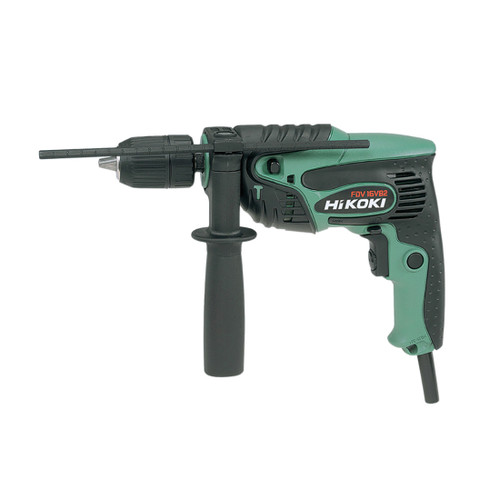-

Milwaukee M12 BPD-202C 12V Sub Compact Percussion Drill with 2x 2.0Ah Batteries
In Stock
Add to Basket£184.20£153.50 (ex.VAT) -

Einhell EINTCID1000E TC-ID1000E Impact Drill 1010W 240V
In Stock
Add to Basket£49.92£41.60 (ex.VAT) -

-


-


HiKOKI HIKDV20VB2 DV20VB2 13mm Keyless Rotary Impact Drill 790W 240V
In Stock
Add to Basket£157.26£131.05 (ex.VAT) -

Einhell EINTECD1848 TE-CD 18/48 Li-i Power X-Change Impact Drill 18V 2 x 2.0Ah Li-ion
In Stock
Add to Basket£93.46£77.88 (ex.VAT) -


-


HiKOKI HIKFDV16VB2 FDV16VB2/J1 13mm Keyless Rotary Impact Drill 550W 240V
In Stock
Add to Basket£80.37£66.97 (ex.VAT) -


-


HiKOKI HIKFDV16VB2L FDV16VB2/J2 13mm Keyless Rotary Impact Drill 550W 110V
In Stock
Add to Basket£75.80£63.17 (ex.VAT) -


Milwaukee M12 FPDXKIT-602X 12V Fuel™ Sub Compact Percussion Drill with 2x 6.0Ah Batteries
In Stock
Add to Basket£289.50£241.25 (ex.VAT)
Percussion Drills
Percussion Drills
Percussion drills, also known as hammer drills, are power tools designed for drilling into hard materials such as concrete, masonry, or stone. They combine rotary drilling with a pulsating hammering action to create rapid impacts, allowing the drill bit to penetrate tough surfaces more easily. The hammering action helps break up the material while the rotary motion drills the hole. Percussion drills often have a switch that allows the user to turn off the hammering action for regular drilling tasks, making them versatile tools suitable for both general drilling and more challenging applications.
Shop the range now with free delivery over £50 for Mainland UK and 0% interest finance.
Percussion Drill Features
Hammering Action
The primary feature of percussion drills is their hammering action, which delivers rapid impacts to the drill bit. This enables easier drilling into hard materials like concrete and masonry by breaking up the surface.
Variable Speed Control
Many percussion drills offer variable speed settings, allowing users to adjust the drilling speed according to the material and application. This feature provides better control and precision during drilling tasks.
Forward/Reverse Function
Most percussion drills have a forward/reverse switch, enabling the drill to rotate in both clockwise and counterclockwise directions. This feature is useful for tasks such as screwdriving or removing stuck drill bits.
Depth Control
Some percussion drills come with depth control settings or depth stops. These allow users to set a specific drilling depth, ensuring consistent and accurate hole depths for repetitive drilling tasks.
Ergonomic Design
Percussion drills often feature ergonomic designs with comfortable grips and handles. This allows for extended use without excessive strain or fatigue on the user's hands, improving overall user experience and control during drilling operations.
Best Sellers
Some of the best-selling percussion drills that we stock are:
- Milwaukee M18FPD2-0 18V Fuel Percussion Drill (Body Only)
- Milwaukee M12 BPD-202C 12V Sub Compact Percussion Drill with 2x 2.0Ah Batteries
- Makita HP1631K/2 Corded Percussion Drill 710W 240V
Other popular power tools at Toolden
Check out some of the most popular power tool categories at Toolden:
Please do not hesitate to contact us if you have any further questions.
FAQs
What is the difference between a percussion drill and a regular drill?
The main difference between a percussion drill and a regular drill lies in their drilling capabilities. A regular drill is designed for basic drilling tasks in softer materials like wood or plastic, providing rotational motion to drive the drill bit into the material. On the other hand, a percussion drill, also known as a hammer drill, incorporates a pulsating hammering action in addition to rotation. This hammering action enables the drill to effectively penetrate harder materials like concrete or masonry by breaking up the surface while drilling. Regular drills lack this hammering feature and are better suited for general drilling applications in softer materials.
What materials can be drilled using a percussion drill?
Percussion drills are specifically designed to drill into tough materials such as concrete, masonry, stone, and brick. The hammering action of the percussion drill helps break up the hard surface, allowing the drill bit to penetrate effectively. These drills are commonly used in construction, renovation, and DIY projects where drilling into challenging materials is required. While percussion drills can still be used for drilling softer materials like wood and plastic, their true strength lies in their ability to tackle tough materials that regular drills may struggle with.
Is it necessary to use special techniques when using a percussion drill?
When using a percussion drill, there are a few techniques to keep in mind for optimal results. First, it is important to apply consistent pressure while drilling to maintain contact between the drill bit and the surface. Second, letting the drill do the work by allowing the hammering action to break up the material rather than applying excessive force can prevent unnecessary strain on the drill. Additionally, periodically withdrawing the drill slightly to clear out debris during drilling can enhance efficiency. Finally, wearing appropriate personal protective equipment, such as safety goggles and ear protection, is essential for safety when operating a percussion drill.
